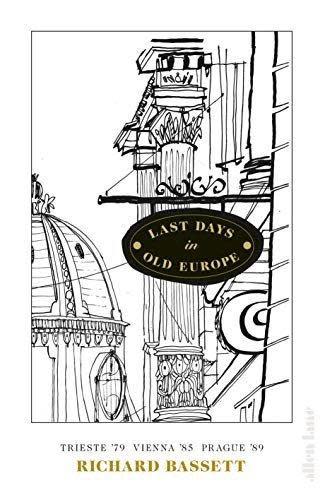Last Days in Old Europe by Richard Bassett - review: rousing romp with our man in Mitteleuropa
Most memoirs by former journalists, in particular those by erstwhile foreign correspondents, fail lamentably for one of two reasons. Often the “I” in the book is so boring or unlikeable that the hack’s sheer narcissism gets in the way of the great events he or she witnessed. Other times the story isn’t strong enough to be worth much more than a “long read” magazine piece. The padding — brave journo defies the odds and tight deadlines to break vital news — can’t sustain an entire book.
A vastly enjoyable exception to the rule is Richard Bassett’s charming, imaginative and elegantly written memoir of his adventures in central Europe, for many years as a correspondent for The Times.
Bassett had a life before working for a newspaper. He travelled widely in Mitteleuropa after Cambridge and used his charm and contacts to meet a range of colourful characters during a year in Trieste, in search of the few remaining embers of the Habsburg empire. He writes evocatively of the city, once one of the most important ports in Europe, and its people — from an encounter with the lady-in-waiting to Princess Sophie, wife of the Franz Ferdinand murdered in Sarajevo, to a capo in the local mafia.
Bassett was also a professional musician and in the late 1970s landed a job as principal horn player in the orchestra of the Slovenian National Opera Company in Ljubljana, where the repertoire included everything from Wagner to Mozart. His observations about music, architecture and German poetry are erudite and he is astute about the rise of nationalism in Yugoslavia, which would soon lead to bitter warfare.
"He meets Zita, the last empress of Austria, and writes hilariously about vicious rows at the Vienna Opera."
Victor Sebestyen
He has a soft spot for the Habsburgs, “the embodiment of a culture which took seemingly irreconcilable differences in its stride and whose sum was always greater than the constituent parts”.
He joined The Times in his 20s as Central European correspondent in the last years of the Cold War. Though he mentions some stories he broke, for example scoops about the campaign by one-time SS officer Kurt Waldheim to be president of Austria, and various spy scandals, Bassett is more interested in what he calls “old Europe”. He frequents white-tie balls at aristocrats’ palaces — he is very keen on superannuated baronesses — meets Zita, the last empress of Austria, and writes hilariously about vicious rows at the Vienna Opera. What he calls the charm of Old Austria was not always so charming.
Bassett is rather less assured in the last third of the book when he turns to the revolutions of 1989 and the collapse of the Soviet order in Central Europe. He understood communism, having seen so much of it during its dying days behind the Iron Curtain, but his style of short, funny vignettes, filled with irony and eccentric characters, which works so well for most of the book, is less effective when he is trying to describe the big events of that extraordinary year.

His strange section on the Velvet Revolution in Prague, claiming it was all a plot orchestrated by the KGB, is way off beam and ignores recent evidence from Moscow and Prague. He writes interestingly about taking a train from Berlin to Leipzig on November 9 1989 and onward to a remote village to see a small anti-Communist demonstration. We have to fill in the gap ourselves: that this was the historic night the Berlin Wall was breached, when the rest of the world was watching, and he wasn’t there.
Yet the book is full of insight about the death of two empires, the Habsburg and the Soviet. In the age of nostalgia we have now entered, when to so many people almost everywhere the past seems so golden, it strikes a remarkably topical chord.
Last Days in Old Europe: Trieste ’79, Vienna ’85, Prague ’89 by Richard Bassett (Allen Lane, £16.99)

 Yahoo News
Yahoo News 